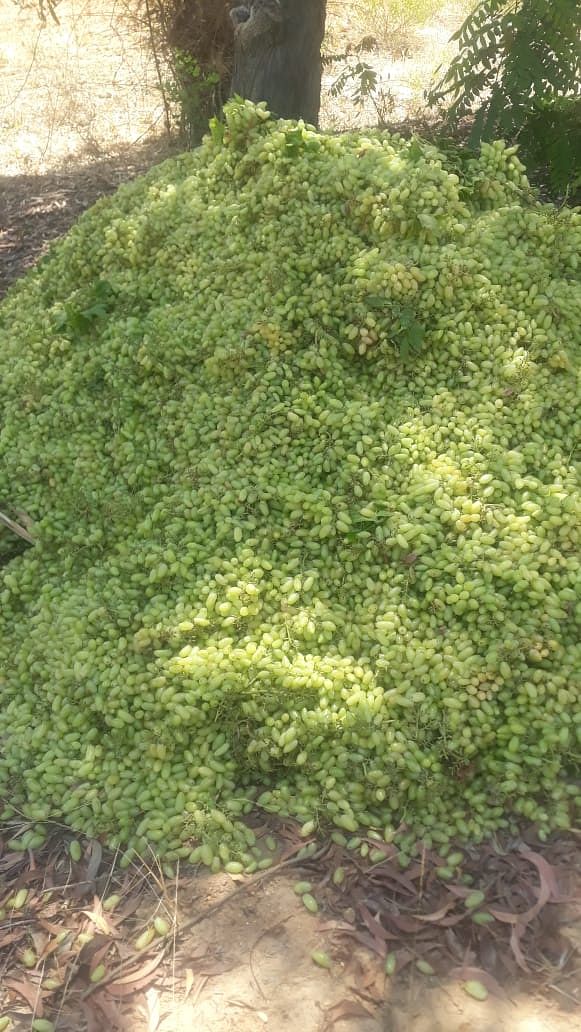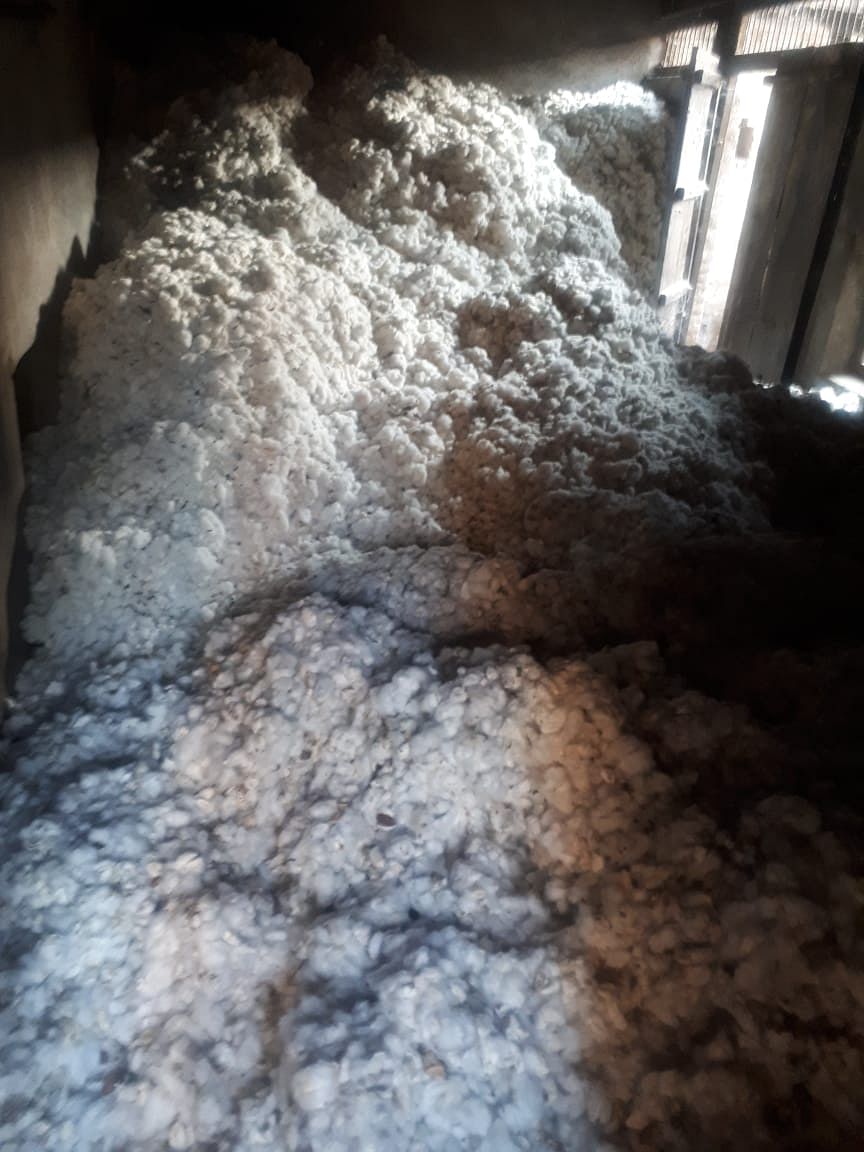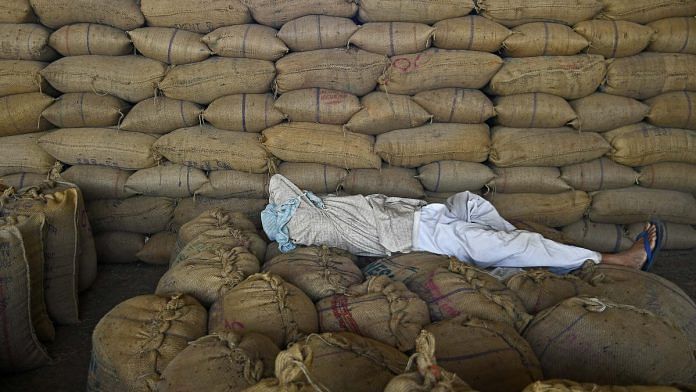Mumbai/Bengaluru: Trimbak Appasaheb Fad, a grape farmer from Jalkotwadi in Osmanabad district in Maharashtra, is destroying his grape harvest for the season.
Grown for the export market, the slightly sweet grapes with a thicker skin than what is available in the domestic market, is rotting in his fields. His entire crop standing on 30 acres is destroyed taking along with it the financial stability he had built around his business. “I have lost everything. I have become a pauper,” Fad told ThePrint.

A four-hour drive away is Satona in Parbhani district. For cotton farmer Mahesh Satonkar it was a good crop year. Harvested in early February, Satonkar had stocked the produce waiting for the state government to open its procurement centres. The buzz in the farming community was that the state government’s procurement price would be better than the private spinning and weaving mills’ offer of Rs 5,000 per quintal.
However, with the Covid-19 outbreak wreaking havoc, the government didn’t open its procurement centres. Since 15 March, the Marathwada region, where Parbhani is located, has received heavy unseasonal rains that have destroyed the harvest kept in the fields covered with tarpaulin sheets.
“I have lost so much. The cotton is lying in the godown with no buyer. What was kept in the fields has been destroyed by the unseasonal rains,” said Satonkar.

Over 900 km away from Osmanabad lies the Konkan belt of Maharashtra, which sends its famed Alphonso mangoes across the globe. Here, the Naik family from Deogad exports its Alphonso produce to West Asia annually. When they spoke to buyers in Saudi Arabia in October 2019, the mood was the “usual positive”. But as the coronavirus outbreak spread across the world, the Naiks called up the Saudi buyer, and their world came crashing down.
“By February end the produce is ready for harvest. We harvested a little, but then the lockdown was announced in India. The mangoes are (now) rotting on the trees,” said Babasaheb Naik, to ThePrint.
This is the story all across Maharashtra. Amid a three-week nationwide lockdown imposed on 24 March, the domestic markets are closed and there are no buyers for the farm produce, including onions, corn, soyabean, potatoes and vegetables.
January to March is the peak season for the sale of rabi produce including wheat, jowar and channa dal. But since the crops is harvested by migrant labour, which has now left for villages in Bihar, Uttar Pradesh, Andhra Pradesh, Telangana and Karnataka, a severe manpower shortage has also hit the farms.
The closure of temples has hit the trade of flowers hard too, particularly marigold and mogra farmers.
Also read: Lockdowns have dragged global manufacturing into a historic slump
‘Difficult to quantify losses’
Pasha Patel, ex-chairman of the State Agriculture Price Commission, said this is the time for the export of perishable farm produce like vegetables, grapes, mangoes, flowers and fruits.
“Every harvest is rotting… It is very difficult to quantify the losses to the farming, poultry and the dairy sector at this point of time. When the big farmers are financially destroyed, the small and medium farmers have been completely wiped out,” said Patel.
If 2019 saw a bad crop year due to excessive rains in some parts of Maharashtra and drought in other parts, then this year will be the worst, said Madan Bhise, a sugarcane farmer from Latur.
Last year many farmers could not sow the kharif crops, usually done between June and October, due to heavy rains and floods.
“There will be a severe shortage of foodgrains this year,” said Bhise. “The sugarcane produce was very less this year as rains, floods or drought (across the sugarcane belt in the state) destroyed the shoots which were planted. With less produce the sugarcane crushing season is already over before it even began.”
The low produce has put the financially stressed sugar mills in a far deeper economic crisis, whether in the sugarcane belt of Western Maharashtra or Marathwada, said a source at the Manjara Shetkari Sahakari Sakhar Karkhana Ltd, a sugar cooperative started by former Maharashtra chief minister and Union Minister Vilasrao Deshmukh.
These losses are set to dent the economy in India’s richest state as agriculture contributes 11.3 per cent to the state’s total GDP of Rs 32.2 lakh crore, according to Maharashtra’s Economic Survey for 2019-20.
With an estimated 53 per cent of the population dependent on agriculture and allied services in the state, where wheat, jowar, bajra, rice and pulses are the main crops, a huge section of the populace is also going to be adversely impacted.
Also read: Coronavirus pandemic risks weakening the climate change battle
‘Who will compensate?’
Umesh Shinde, a vegetable farmer with a five-acre farm said there are no domestic buyers for the produce as the markets are closed, and there is a severe manpower shortage to take the produce to the cities.
“My buyers in the Thane market have told me that even at extremely low prices there are no buyers. What do I do with the vegetables now? Who will compensate my loss?” said Shinde.
The political crisis last year pertaining to government formation in Maharashtra delayed the decisions on opening the procurement centres for farm produce across the state.
Many of the farmers ThePrint spoke to said the crop losses could have been stemmed to some degree had the procurement centres been opened.
According to Satonkar, the state government started their centres to buy tur dal only after the farmers sold their produce. “Tur dal is harvested before Diwali. We need money during the festival season. By December last year we had sold tur dal to local buyers at Rs 4,000 per quintal.
“In February this year, the central government opened their procurement centres for tur dal. The buying price was Rs 6,500 per quintal. Had these centres been opened much earlier, we would have gained,” said Satonkar, adding that the state government has not opened any buying centres this year.
The farmers said both the state and the central governments will have to announce customised compensation packages for different produce.
“This is not like the previous times. In drought or in floods at least the markets were open and there were buyers. This time the financial loss is complete,” said Patel. “Therefore the compensation has to be according to the crop losses, not a composite compensation package.”
But farmers are apprehensive about the insurance companies too, worried that they won’t be compensated.
In 2019, farmers in over 10 districts of Maharashtra had a tough time getting compensation for the destroyed rabi crops under the Centre’s Pradhan Mantri Fasal Bhima Yojana as none of the insurance companies filed any bids to implement the scheme. The firms moved only after strict warnings.
Also read: Pay loan EMI if you can. Interest payable will increase if you don’t, banks tell borrowers
The Karnataka situation
It’s not just the Maharashtra farmers who are struggling amid the crisis. Their peers in the neighbouring Karnataka are also in dire straits.
The state’s grape cultivation has suffered due to lack of transport facilities, forcing farmers to dump their produce worth crores into compost pits.
The northern stretch of Karnataka covering the districts of Bagalkot, Vijayapura and Belagavi as well as places closer to the state capital like Bengaluru Rural, Chikkaballapur and Kolar districts have been unable to export their grapes. The takers too have dwindled as the lockdown has forced down the shutter of liquor vends.
“All markets have closed down, and many of the agriculturalists are unable to transport their goods or steel their produce. At this time in Karnataka, turmeric, grapes and ginger are produced. Tomatoes, bananas and other produces are rotting,” said Kodihalli Chandrashekhar, president of a farmers’ collective and a political outfit called Karnataka Rajya Raitha Sangha.
“The farmers have been forced to drastically reduce their prices or just dump them on the roads. Several northern states are consumers of Karnataka’s ginger,” he said.
The state’s dairy farmers were also forced to dump nearly 15,000 litres of milk into the Ghataprabha river a few days ago because of the lockdown. A video of it went viral, bringing the issue to the state government’s notice.
The demand has come down so drastically that the Karnataka Cooperative Milk Producers’ Federation (KMF) has an excess of 8-10 lakh litres of milk and it is not in a position to convert this into milk powder either, according to media reports.
With the silk industry not being counted as an essential service, Karnataka’s sericulture units around Mysuru, Kolar, Bengaluru Rural and Chikkaballapura districts are also worried as cocoons are a perishable commodity and need to be sold in time for the reeling process.
On Wednesday, Karnataka chief minister B.S. Yediyurappa said in a statement that his government is looking to find alternative ways of processing grapes and tomatoes wherever possible. He has further directed the police to ensure uninterrupted movement of essential goods.
The government has also decided to buy excess milk from KMF and distribute it in slum areas, said the CM among other announcements.
Also read: Stocks crash is once-in-a-decade buying chance for long-term investors: ICICI fund manager




It feels terrible watching the farmers pouring tomatoes on the street, and running tractors over cabbages. This is one big failure on the part of local government and district administrations. While cities wait for vegetables, they rot in villages for want of transport.